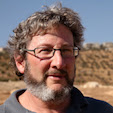Jack Doppelt
March 26, 2021
[This is the second in a series of three stories published in preparation for the upcoming Passover holiday. A version of this piece has been incorporated into our family's Passover Haggadah since 2014.]
It is disorienting to be in the holy land in 2014 as Passover looms, to be in occupied Palestine, pondering oppressor and oppressed.
The Passover Seder is my bedrock as a Jew. My father’s stature in my eyes is rooted to his role as searching leader of the multi-hour dinner theater cabaret. I've never met either of my grandparents or anyone who came before them.
Yet I take on faith, something more real than Biblical faith, that they read from the Haggadah from generation to generation. Did they honor the Passover story as one in which we were the Chosen People protected by a discriminating God or one in which we were the oppressed guided into liberation by a just but vengeful God? For generation after generation, the two parables were inextricable. Are they now?
Years ago, I wrote my first Haggadah and I’ve been revising it irregularly ever since. There are my emendations that call upon Sholem Aleichem’s Helmites, Sandy Koufax, an Elijah who brings with him the tradition of the miracle, and Grace Paley’s realization that there were neighbors where she grew up in New York who were not Jewish but who nonetheless "often seemed to be in a good mood."
To be sure, it is more confusing being a Jew with eyes open in the occupied territories than it is being a Jew with eyes restfully closed in the comfort of privilege. I process the story of Sheldon Adelson declaring from on high in Las Vegas that Republican candidates are not to use the term “occupied territory.” It is understandable for Jews to fear relenting, and to need to say with resoluteness that this land is our land to live in and to protect. It is also almost unbearable to ignore the arrogance and brutality that comes with being an occupier and an oppressor of others who share that land. It strains reason or imagination to see Adelson as Moses on the Mount and not Pharaoh on the throne. It also mocks my father’s sense of decency, and he was a learned man.
Still it is confusing. Within 15 minutes on the main road running the length of the West Bank of the Jordan River, I was drawn into the enigma of the day. I was being driven around by a young Palestinian couple who were kind enough to offer to show me the land. We were heading south from Nablus to Ramallah and we hit a traffic snag.
 |
| Photo credit: Jack Doppelt, April 2014 |
We sat, as one car after another in front of us peeled off from the stalled line of cars, and paused to our left to explain briefly in Arabic that it was settlers raising some kind of ruckus. We complied, and turned around, not knowing what alternative road we would take. We knew nothing more, and my hosts thought better than to try to find out. I asked why, do they think, and they said, “because they can.” A few minutes later, on a different stretch of road, we encountered four young, loosely masked boys, in Palestinian red and green. They were gathering stones and preparing for a confrontation they seemed intent on provoking. My hosts again did not want to know more. We drove on.
 |
| Photo credit: Jack Doppelt, April 2014 |
Passover looms. It has always been a celebration of spirit and perseverance and justice for me, one in which we thank God as we recall grand gifts we’ve been given - getting out of Egypt, dividing the Red Sea, surviving 40 years in the desert, and being given the Sabbath, the Torah, the Temple and a place to live. Dayena. Any of them would have been enough. And yet with that celebration, I feel a personal and collective shame that it is not enough, and we seem to rejoice in using our power to oppress.
Why? Because we can?
 |
| Photo credit: Jack Doppelt, April 2014 |
#####



1 comment:
This is powerful. Thank you for sharing, Jack.
Post a Comment